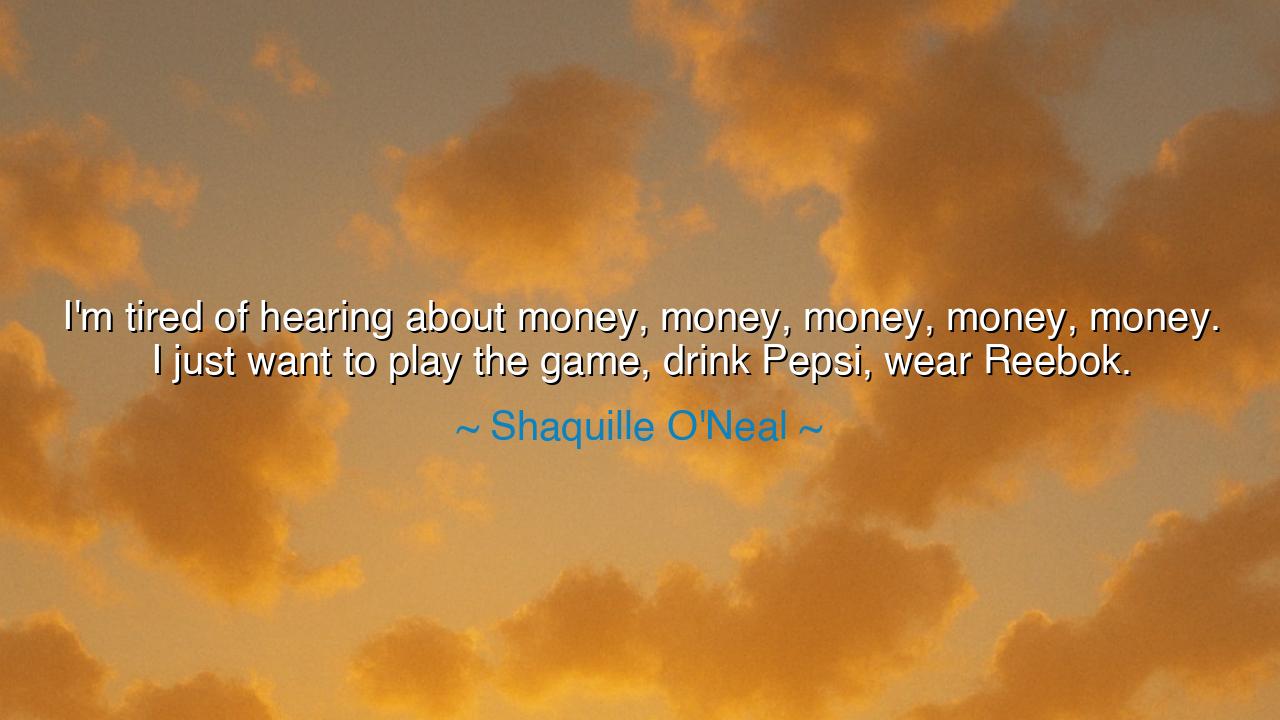
I'm tired of hearing about money, money, money, money, money. I
I'm tired of hearing about money, money, money, money, money. I just want to play the game, drink Pepsi, wear Reebok.






In the modern age of spectacle and commerce, when games became not only contests of spirit but also engines of wealth, there arose the mighty voice of Shaquille O’Neal, a giant in stature and in presence. With both humor and exasperation he declared: “I’m tired of hearing about money, money, money, money, money. I just want to play the game, drink Pepsi, wear Reebok.” At first, it seems a playful quip, a shrug of the shoulders from a man blessed with riches. Yet within these words lies a deeper cry, a truth about the burden of wealth, the purity of play, and the longing of the heart to return to simplicity.
For to speak of money is to speak of the endless noise that surrounds greatness. Contracts, endorsements, negotiations—all these are chains that bind the joy of the game. Shaq’s lament is not against wealth itself, but against its intrusion into the sacred space of sport. He reminds us that before the contracts and the sponsorships, there was only the ball, the court, and the love of play. In this sense, his words are a yearning for innocence, for the freedom to enjoy the game without the weight of commerce pressing down upon it.
The ancients too knew this longing. Consider the tale of King Midas, who asked that all he touched be turned to gold. At first, it seemed a blessing; soon it became a curse. He could not eat, nor embrace his loved ones, for everything became lifeless treasure. So too with the athlete who gains untold riches but finds the simple joy of play suffocated beneath it. Shaq’s jest is the cry of one who refuses the curse of Midas, who longs to keep the heart of a child within the body of a champion.
And yet, there is irony in his words. To “drink Pepsi” and “wear Reebok” are themselves tied to commerce, to endorsements and brands. But here lies the brilliance of Shaq’s humor: he acknowledges the reality of the modern athlete, bound to the world of promotion, yet insists that these things remain light, playful, and secondary. He desires not the obsession with counting dollars, but the enjoyment of simple pleasures that accompany the life of sport.
This teaching is not only for athletes. In every field of labor, men and women may find themselves enslaved to money, money, money—forgetting why they began their craft, why they pursued their art, why they took up their vocation. Shaq’s words remind us that joy, play, and simplicity must not be lost in the chase for wealth. Riches may follow, but they should never be the goal. The goal is the game itself, the work itself, the calling that stirs the heart.
History offers us another lesson in the life of Vincent van Gogh, who died in poverty, yet painted with a passion that money could not corrupt. Though the world scorned him in his time, his devotion was pure. He did not paint for wealth, but because his soul demanded it. So too Shaq’s words echo: to play for love, not merely for profit, is to live truly. Wealth may come, but it must never be the master.
So let these words be preserved: “I just want to play the game.” This is the essence of all true devotion. Do not allow the noise of money to drown the music of your calling. Enjoy the simple joys—the ball in hand, the laughter of friends, the taste of your chosen drink, the comfort of your chosen shoes. Live with the heart of a child even when the world calls you a giant. For in the end, it is not the money counted that defines a life, but the joy lived within it.






AAdministratorAdministrator
Welcome, honored guests. Please leave a comment, we will respond soon